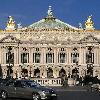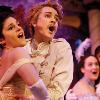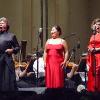

- » Is the market recovering? Reports from NY, Washington, London and more
- » Meet the new boss: Hurd to adjust to life as deputy under Ellison in test of friendship
- » Claudio Abbado's illness cancels highly anticipated return to La Sacala after 25-year absence
- » Opera says Web browser downloads double after Microsoft forced to offer choice to users
- » Opera says Web browser downloads doubled after Microsoft forced to offer choice to users
- » Venezuelan cable providers drop TV channel critical of President Hugo Chavez
- » Venezuela cable providers drop TV channel critical of President Hugo Chavez
- » Venezuelan government pressures cable television providers to drop anti-Chavez channels
- » SKorean team named Mobile World Cup texting champs
- » Audience shouts 'shame' as La Scala performers don street clothes in labor protest
Perspektive korrigiert Tags: Opera View |
Topics: Technology Tags: Opera View |
Topics: Technology Tags: Opera View |
|||||||||
opera ??? Topics: Technology Tags: Opera View |
http www icatch tv search opera opera?? 320 x 382 opera athenes jpg 27 6kBkbyte ??URL http www altamusica com concerts document php action=MoreDocument amp DossierRef=1433 amp DocRef=1679 L Op�ra des calendes � Op�ra Topics: Technology Tags: Opera View |
Topics: Technology Tags: Opera View |
|||||||||
Topics: Technology Tags: Opera View |
Opera is an art form (Performing arts) in which singer (Singing)s and musicians perform a dramatic work combining text (called a libretto) and musical score (Sheet music). Opera is part of the Western classical music tradition. Opera incorporates many of the elements of spoken theatre, such as acting, scenery (Theatrical scenery) and costumes and sometimes includes dance. The performance is typically given in an opera house, accompanied by an orchestra or smaller musical ensemble.
Opera started in Italy at the end of the 16th century (with Jacopo Peris lost Dafne, produced in Florence around 1597) and soon spread through the rest of Europe: Sch�tz (Heinrich Sch�tz) in Germany, Lully (Jean-Baptiste Lully) in France, and Purcell (Henry Purcell) in England all helped to establish their national traditions in the 17th century. However, in the 18th century, Italian opera continued to dominate most of Europe, except France, attracting foreign composers such as Handel (George Frideric Handel). Opera seria was the most prestigious form of Italian opera, until Gluck (Christoph Willibald Gluck) reacted against its artificiality with his "reform" operas in the 1760s. Today the most renowned figure of late 18th century opera is Mozart (Wolfgang Amadeus Mozart), who began with opera seria but is most famous for his Italian comic operas, especially The Marriage of Figaro, Don Giovanni, and Cos� fan tutte, as well as The Magic Flute, a landmark in the German tradition.
The first third of the 19th century saw the highpoint of the bel canto style, with Rossini (Gioachino Rossini), Donizetti (Gaetano Donizetti) and Bellini (Vincenzo Bellini) all creating works that are still performed today. It also saw the advent of Grand Opera typified by the works of Meyerbeer (Giacomo Meyerbeer). The mid to late 19th century was a "golden age" of opera, led and dominated by Wagner (Richard Wagner) in Germany and Verdi (Giuseppe Verdi) in Italy. The popularity of opera continued through the verismo era in Italy and contemporary French opera through to Puccini (Giacomo Puccini) and Strauss (Richard Strauss) in the early 20th century. During the 19th century, parallel operatic traditions emerged in central and eastern Europe, particularly in Russia (Russian opera) and Bohemia. The 20th century saw many experiments with modern styles, such as atonality and serialism (Schoenberg (Arnold Schoenberg) and Berg (Alban Berg)), Neoclassicism (Stravinsky (Igor Stravinsky)), and Minimalism (Philip Glass and John Adams (John Adams (composer))). With the rise of recording technology, singers such as Enrico Caruso became known to audiences beyond the circle of opera fans. Operas were also performed on (and written for) radio and television.
Ancestor: Drama
Culture: Italy
Era: late 1500s Performing arts







